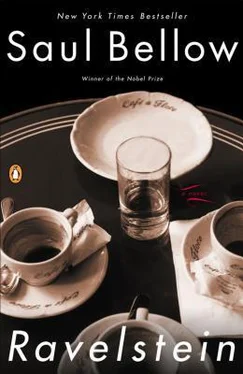In the country he never set off on his own across a field. He _looked__ the woods and meadows over but had no other business with them. Somehow Rousseau, who was so fond of fields and woods, was at the back of Abe's mind. Rousseau botanized. Plants, however, were not Ravelstein's dish. He'd eat a salad but he couldn't see the point of meditating on it.
He had come to the country to see me, and the visit was a concession to my unaccountable taste for remoteness and solitude. Why did I want to bury myself in the woods? It was a safe assumption that he had examined my motives from more angles than I could ever think up if I brooded over them for an aeon. It is also possible that he was curious about my then-wife Vela-those were the pre-Rosamund days-still trying to understand why I had married such a woman. Now _there__ was a question for you. He had real intelligence, you see, a working, persistent mind, whereas I was only occasionally, fitfully, intelligent. What he thought out, and thought through, sat upon a foundation of tested principles.-How shall I put it?… As birds went he was an eagle, while I was something like a flycatcher.
He knew, however, that I could understand his principles-they didn't even need to be explained to me. If he had a single illusion it was that somehow I was capable of accepting correction, and he was a teacher, you see. That was his vocation-he taught. We are a people of teachers. For millennia, Jews have taught and been taught. Without teaching, Jewry was an impossibility. Ravelstein had been a pupil or, if you prefer, a disciple of Davarr. You may not have heard of this formidable philosopher. His admirers say that he is a philosopher in the classical sense of the term. I am no judge of such things. Philosophy is hard work. My own interests lie in a different direction altogether. Within my mental limits I think of the late Davarr with respect. Ravelstein talked so much about him that in the end I was obliged to read some of his books. It had to be done if I was to understand what Abe was all about. I used to run into Davarr on the street, and it was hard to imagine that this slight per son, triply abstracted, mild goggles covering his fiery judgments, was the demon heretic hated by academics everywhere in the U. S. and even abroad. As one of Davarr's chief representatives, Ravel-stein was hated, too. But he didn't at all mind being the enemy. He was anything but faint-hearted. I didn't much care for professors as a class. They haven't had much to offer us in the unbearable century now ending. So I thought, or used to think.
It is pleasant to consider the week of Ravelstein's country visit. Quiet New England in long, narrow frames-sunlight, greenery, the bed of orange-red poppies next to the red-and-white peonies.
Glancing through the Venetian blinds (he separated and widened the slats with shaking fingers) he saw the blossoms-just then the azaleas were coming into bloom-and found it all very well but the drama of the season lacked real interest. Not to be compared to the human drama.
He asked, "Is your wife always like this?"
"Like what?"
"_'What__,' the man says. Fourteen hours a day bolt upright with her books and papers, Vela shut away in her country-cupboard room."
"I see what you mean. Yes. That's the way she is about her chaos physics."
"To sit without budging-without even breathing. You never see her breathe at all. How does she manage not to suffocate?"
"She's preparing her paper. She's supposed to attend a conference to comment on somebody's research."
"She must catch up on her breathing-in snatches. I've watched her," said Ravelstein, "and I don't think she inhales except in an underground way."
Of course he was exaggerating. But there were facts to support him. Moreover, he had maneuvered me into accepting his way of speaking about her. Before I could consider whether to agree or disagree he had already persuaded me. What he was suggesting was that I didn't have to accept Vela's behavior. When we went to the country she locked herself up in her room. Two solitudes were then created. That was what our summers in New England were like: under one sun, on one planet, there were these two separate existences. Vela was especially beautiful when she was silent. Silent, she seemed to be praying to her beauty. Ravelstein may have been aware of this.
He came to New Hampshire to be with me very briefly, and he immediately understood what I had gotten into. He detested the rural scene, but for my sake he put his life on hold. He didn't like leaving his city switchboard command post. To be cut off from his informants in Washington and Paris, from his students, the people he had trained, the band of brothers, the initiates, the happy few made him extremely uncomfortable.
"So this is how you spend your summers?" he said.
As often as possible he went to Paris for a week or, even better, for a month. Paris, he granted, was no longer what it used to be. Nevertheless he often quoted Balzac's statement that no event anywhere in the world was an event until it was observed, judged, and certified by Paris. Still, the good old days were gone. Czarinas and kings no longer imported poets or philosophers from Paris. When foreigners like Ravelstein spoke to a French audience on Rousseau, the lecture hall was packed. One could say that genius was still welcome in France. But very few French intellectuals got high marks from Abe Ravelstein. He did not care for foolish anti-Americanism. He had no need to be loved or pampered by Parisians. On the whole, he liked their wickedness more than their civility.
Paris (this is an important aside) was where Abe Ravelstein and Vela had their first falling out. He was there when she and I flew in to accept a prize given to foreign writers. We were staying at the Pont Royal Hotel. Impatient, in high spirits, keen to see me, Ravel stein called out from the anteroom and without waiting for an answer he rushed in. He intended to hug me-or Vela, if she should happen to be first. But she was in her slip and she wheeled round and ran, slamming the bathroom door. But Abe and I, happy to see each other again after so many months, hardly gave a thought to Vela, or to Ravelstein's impropriety in barging into the bedroom. He should at least have knocked. It was her bedroom, as she was to remind me.
I might have known from the dainty anger of her running that Ravelstein was guilty of an outrage. I was unwilling to take her notions of good conduct into account. She said afterward that she could never forgive him for blundering into her room. Why did he rush in without warning, before she was dressed?
"Well, he's impetuous," I said. "With a man like Ravelstein it's… it's one of his charms that he acts on impulse…."
This didn't soften Vela. Every word I spoke to explain Ravelstein or to defend him went immediately into her retaliation stockpile to be fired back at me. "I didn't come to Paris to see your pals," she said. "Or to have them walk in on me when I'm half naked."
"You show more of yourself at the beach," I said. "In what the fashion minimalists call a bathing suit."
Vela dismissed this, too. "It's a different context and you have a right to make preparations. You talk to me in a very superior way, as if you are putting me down as an ignorant woman. You should please remember that I stand as high in my field as you do in yours."
"Of course you do. And even higher," I said.
I am accustomed to being downgraded by businesspeople, lawyers, engineers, Washington hotshots, various scientists. Even their secretaries, who get their notions of what matters from television, hide their smiles behind their hands and give one another the high sign when I turn up-some incomprehensible goofball.
So I allowed Vela to be as superior as she pleased, while Ravel-stein said I should have more proper pride and that it was phony of me to be so meek. But I wasn't inclined to go out of my way to defer to so many critics. I had a good grasp of reality and of my defects. I permanently kept in mind the approach of Death, who might at any time loom up before you.
Читать дальше












